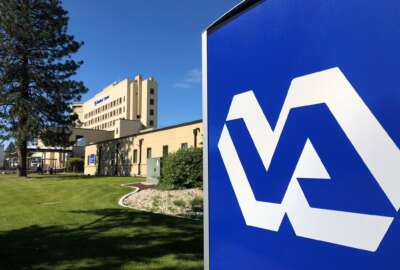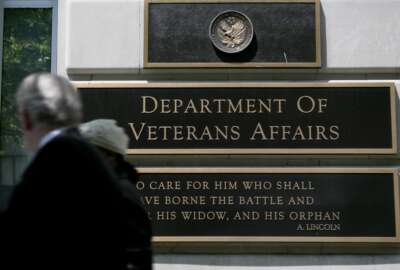Hubbard Radio Washington DC, LLC. All rights reserved. This website is not intended for users located within the European Economic Area.
Exclusive
VA makes data-sharing pledge for ‘seamless’ veteran health care across 13 health care systems
The Department of Veterans Affairs is sharing more of its data with non-VA medical providers — and vice versa — to improve health care for veterans wherever...
The Department of Veterans Affairs is sharing more of its data with non-VA medical providers — and vice versa — to improve health care for veterans wherever they seek help.
The VA announced Friday it’s signing a data-sharing pledge with 13 community health care systems across the country.
Private-sector clinicians with access to VA data, under the pledge, can identify when a patient is a veteran more quickly, and inform the patient about VA-specific benefits they’re eligible to receive.
VA officials told Federal News Network that the data-sharing pledge is a step to ensure veterans receive “seamless” health care between VA and non-VA providers.
“We’re going to help that community provider understand and recognize when that patient in front of them is a veteran. And that’s not something that we really do today,” a VA official told Federal News Network.
Under Secretary for Health Shereef Elnahal said in a statement that the pledge will improve veteran health care “by giving us seamless, immediate access to a patient’s medical history, which will help us make timely and accurate treatment decisions.”
Most non-VA medical providers rely on patients to self-report their veteran status, and may miss the opportunity to tell a veteran about VA-covered health care and benefits they’re eligible to receive.
“Now that you know this patient is a veteran, what can we do? What can we help you with? How can we make this a better experience for the veteran and the provider?” the VA official said.
VA officials told Federal News Network all veterans can benefit from greater data-sharing between the department and community care providers. But it will especially help the VA reach out to veterans diagnosed with toxic-exposure conditions covered under the PACT Act.
The PACT Act expands access to VA health care and benefits for veterans exposed to toxic burn pits during their military service.
VA officials said that, for example, a veteran recently separated from military service could get diagnosed with lung cancer at a non-VA hospital, and may not realize that the cost of her cancer treatment is covered within the VA medical system.
“It doesn’t occur to her that she could get her care from VA, so she stays within the private industry. Of course, she’s responsible for all of those costs. So unless she comes back into the VA for treatment, she will carry that financial burden,” the VA official said. “That’s really the conversation: You have a presumptive condition that is covered under the PACT Act. Have you talked to the VA about it? You could be receiving care at the VA at no cost.”
The VA, under the PACT Act, has expanded coverage to 23 presumptive conditions that were not previously covered.
“If that provider doesn’t know that the patient in front of them is a veteran, they’re not able to have that discussion, and they’re not able to take advantage of those benefits. And that could really affect the veteran. They won’t have access to the resources, and that will increase their cost of care,” a VA official said.
VA’s expanded data-sharing efforts may also help veterans experiencing an acute suicidal crisis and seeking help at a VA or non-VA medical hospital.
Under the Comprehensive Prevention, Access to Care and Treatment (COMPACT) Act, veterans in acute suicidal crises can receive free emergency care at any VA or non-VA health care facility.
The data-sharing pledge can help non-VA clinicians inform veterans about other VA programs, such as assistance for veterans experiencing food or housing insecurity.
“The data that we’re talking about isn’t always going to be clinical data. We’re very interested in what’s referred to as the administrative data, which talks about the benefits a veteran could potentially qualify for,” a VA official said.
The department is able to share veteran data with outside health care providers, VA officials said, because electronic health records have gotten to the point “where the next level of innovation can really happen.”
“We really want this to benefit the industry as a whole,” the VA official said. “As the technology advances, we really feel that VA has a leadership role. As the largest health care system in the country, the largest payer, we absolutely feel that responsibility to get out there and lead on what this could potentially look like.”
The VA is in the process of migrating to a new Oracle-Cerner EHR that’s interoperable with the Defense Department.
“We want to get this so tightly integrated that the community provider, when he’s in the electronic health record, the data that he sees that is actually from VA … he or she doesn’t have to interrupt their workflow, to jump out to another website, for example, to pull down additional data,” the VA official said. “The approach that we’re taking is going to be agnostic to whatever the health record technology is, and really focus on the data and kind of the pipelines that we’re building between them.”
The following health care systems are participating in the VA’s data-sharing pledge:
- Emory Healthcare
- Inova
- Jefferson Health
- Sanford Health
- UC Davis Health
- Intermountain Health
- Mass General Brigham
- Rush Health
- Tufts Medical Center
- Marshfield Clinic
- Kaiser Permanente Health Plan and Hospitals
- UPMC
- Atrium Health
Before drafting the data-sharing pledge, VA officials spoke with the chief information officers and chief medical information officers at participating health care networks, to better understand the process of exchanging veteran data back and forth between VA and non-VA systems.
“We learned a lot. We learned that VA has a lot of work to do itself. But we also learned that the providers are very interested in making this work better. If we can do this right for veterans, then it’s something that can be scaled across the country, and can help every patient,” the VA official said.
VA officials described the data-sharing pledge as the first step toward developing a “proof of concept” by early 2024, which could lead to the VA sharing more of its tools and technology with community providers.
“That’s shoring up the interoperability issue, the low-hanging fruit, of do you know that you’ve got a veteran in front of you, and are we able to exchange the data on him or her the best that we possibly can?” the VA official said. “And then working toward, over the next 12, 24, 36 months, to do some really smart things around pushing that content back and forth.”
The VA expects the data-sharing pledge could lead to the department sharing some of its artificial intelligence tools that are under development.
“The VA is doing some wonderful innovations there. And if this could be a vehicle or a mechanism to get that type of technology embedded in a community provider, to essentially ensure that the veteran’s receiving the same treatment, regardless of where he or she is at, I think that’s absolutely one of the goals that we’re working toward,” the VA official said.
The VA expects its data-sharing pledge will also allow the department to gather better data on the quality of health care veterans are receiving — whether or not that care is coming from VA medical facilities.
“Being able to standardize how you exchange that data is important, but understanding the quality of that data, so that when you do receive elements from two different systems, you can trust that, you can run analytics and statistics against that,” the VA official said.
Copyright © 2024 Federal News Network. All rights reserved. This website is not intended for users located within the European Economic Area.
Jory Heckman
Jory Heckman is a reporter at Federal News Network covering U.S. Postal Service, IRS, big data and technology issues.
Follow @jheckmanWFED





